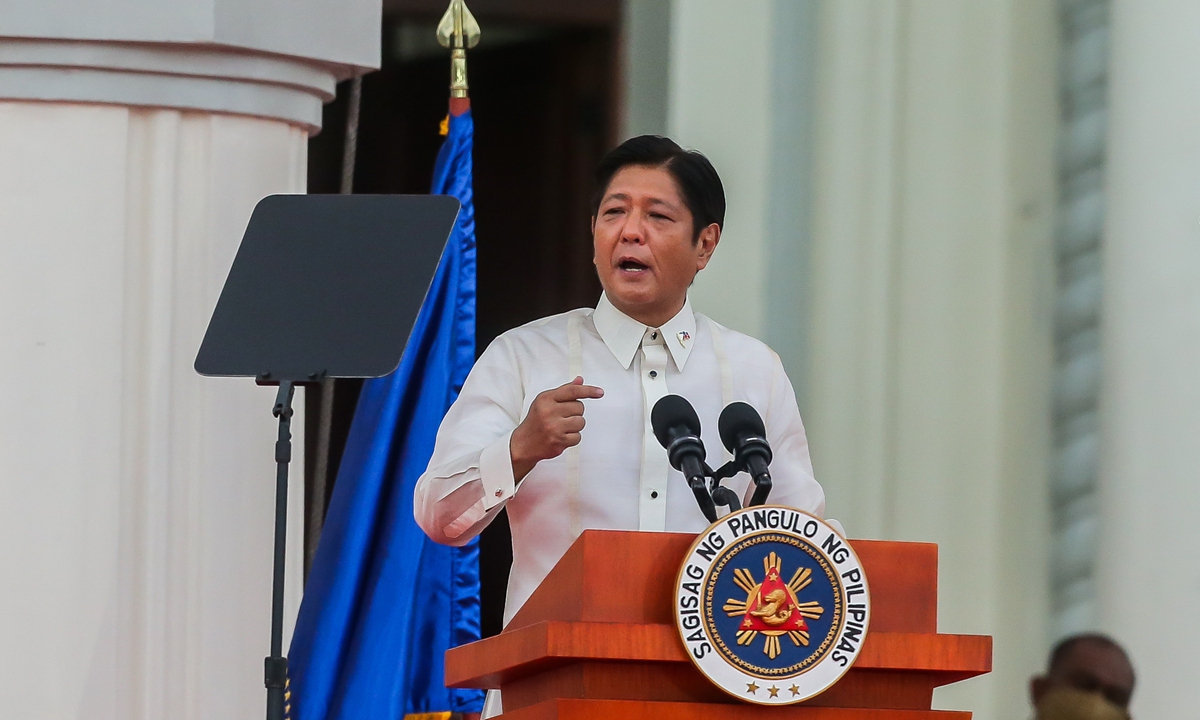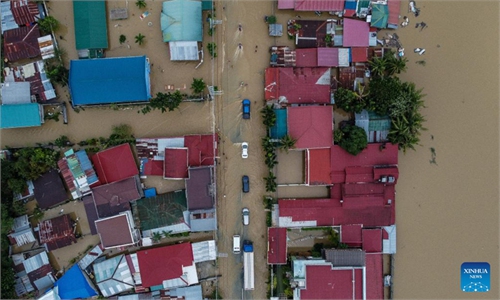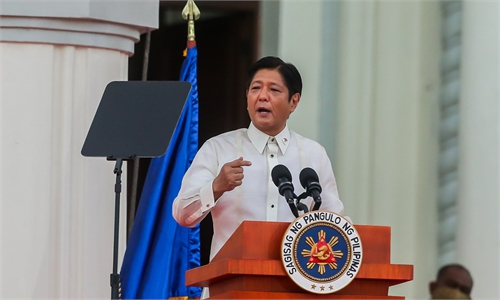Golden age norm of China-Philippines relations set to be continued by Marcos’ visit

Ferdinand Romualdez Marcos, Jr. delivers his inaugural address as the 17th president of the Philippines at the National Museum in Manila in front of thousands of people on July 1, 2022.Photo:Xinhua
Philippine President Ferdinand Romualdez Marcos Jr. is set to commence a state visit to China on January 3, 2023. Considering that the Joe Biden administration has been courting the Philippines, Marcos Jr. went to the US before China after taking office, though it was only to take advantage of the opportunity to attend the UN General Assembly in September2022, and did not constitute an official visit. Many people think that Marcos Jr. is more pro-US than his predecessor Rodrigo Duterte, who never set foot in the US during his six-year term. However, judging from the high importance Manila attaches to this visit, China remains a high priority in the Philippines' foreign relations. Some people even believe that China-Philippines relations may even enter a "new golden age."It is no surprise that Marcos Jr.'s visit to China will yield fruitful results. China and the Philippines are geographically adjacent, and the cultural, economic and trade relations between the two sides have been closely linked. Economically, China is the Philippines' top trade partner, largest source of imports, and second-largest export market. In terms of investment in the Philippines, China is still unable to compare with some developed countries for the time being, but with the in-depth advancement of the Belt and Road Initiative in recent years and the extensive demand for investment driven by post-epidemic economic recovery, the Philippines cannot ignore the huge economic growth "engine" around it.
Many people mention the South China Sea disputes when they analyze China-Philippines relations, but this is only a small part of a wider bilateral relationship. Disputes between neighboring countries are normal; the key is how to deal with these differences. Some people in the West have always exaggerated China's "coercive diplomacy" towards the Philippines. However, in fact, China has been the biggest victim of the South China Sea disputes since the 1970s and has always called for negotiations and consultations, advocating shelving disputes and pursuing joint development. China had to take a series of countermeasures after the Philippines raised the South China Sea arbitration during Benigno Aquino III's time. At present, the situation in the South China Sea has remained generally stable.
There are indeed challenges in China-Philippines relations, and the challenge is the US, because the US is the biggest external factor pushing for politicizing and weaponizing the South China Sea issue. For Washington, the Philippines is the most suitable chess piece to contain China in Southeast Asia. Politically, the Philippines is a former colony of the US, and its political model is built based on that of the US, making it easy for the US to exert influence. In terms of security, the Philippines is a treaty ally of the US. Although the Philippine constitution does not allow foreign countries to establish military bases, the US has hollowed out this limitation through the Visiting Forces Agreement (VFA) and the Enhanced Defense Cooperation Agreement (EDCA), extending its military presence to the periphery of the South China Sea.
But we have reason to be optimistic about the resilience of China-Philippine relations. Although Marcos Jr. is committed to repairing relations with the US after taking office, the new Philippine government is pragmatic in essence and will not become an American lackey. It has become "politically correct" for the Philippines not to abandon the South China Sea arbitration ruling, but a lesson that the Philippines should learn from the South China Sea arbitration dispute in 2016 is that blindly insisting on the arbitration ruling will do more harm than good.
In general, the Philippines under the Marcos Jr. tenure will still adopt a roughly balanced foreign policy between China and the US. The US is a traditional ally of the Philippines, and Manila relies on the US for security. There is no reason for the Philippines to weaken or give up the relationship with the US. But China's economic, security, and political importance is growing, and China is willing to support Marcos Jr.'s domestic and international development agenda. No one expects the Philippines to make sovereignty concessions on the South China Sea issue. It's very difficult for both China and the Philippines to do so. Due to the needs of domestic politics, the South China Sea arbitration case may be mentioned by the Philippines from time to time, but the main theme of the bilateral relations is that the two sides will engage in crisis management and control, and promote joint cooperation and development in oil and gas, fisheries, etc. under feasible conditions.
Being friendly with both China and the US at the same time is beneficial to the Philippines, but if it takes sides in the competition between major powers, no matter which side it offends, it will be unbearable for the Philippines. From a longer-term perspective, pragmatic cooperation is the keynote of China-Philippine relations. China and the Philippines witnessed the golden age of partnership under President Gloria Macapagal-Arroyo. Manila developed sound cooperation with Beijing during the early presidency of President Benigno Aquino III. After the bilateral relationship was bogged down due to the South China Sea arbitration case, President Duterte quickly reversed course. In other words, the golden age of China-Philippine relations is actually the norm, and Marcos Jr. is just continuing this tradition.
The author is research fellow and deputy director at the Institute of International Relations of the Shanghai Academy of Social Sciences. opinion@globaltimes.com.cn



